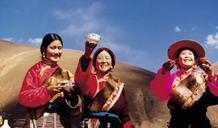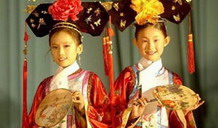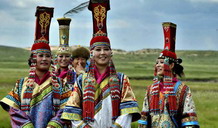The History of Uygur Ethnic Group
The Uygur areas from Hami in the east to Hotan in the south were unified into a greater feudal separatist Kaxgar Khanate after more than two centuries of separatism and feuding from the late 14th century. As the capital was moved to Yarkant, it was also known as the Yarkant Khanate. Its rulers were still the offspring of Jagatai. During the early Qing period, the Khanate was a tributary of the imperial court and had commercial ties with central China. After periods of unsteady relations with the Ming Dynasty, the links between the Uygurs and ethnic groups in central China became stronger. Gerdan, chief of Dzungaria in northern Xinjiang, toppled the Yarkant Khanate in 1678 and ruled the Uygur area. The Qing army repelled in 1757 (the 22nd year of the reign of Emperor Qian Long) the separatist rebellion by the Dzungarian nobles instigated by the Russian Tsar, and in 1759 smashed the "Batu Khanate" founded by Poluonidu and Huojishan, the Senior and Junior Khawaja, in a separatist attempt.
The Qing government introduced a system of local military command offices in Xinjiang. It appointed the General in Ili as the highest Western Regional Governor of administrative and military affairs over northern and southern Xinjiang and the parts of Central Asia under Qing influence and the Kazak and Blut (Kirgiz) tribes. For local government, a system of prefectures and counties was introduced.
The imperial court began to appoint and remove local officials rather than allowing them to pass on their titles to their children. This weakened to some degree the local feudal system. The court also encouraged the opening up of waste land by garrison troops and local peasants, the promotion of commerce and the reduction of taxation, which were important steps in the social development of Uygur areas.
Xinjiang was completely under Qing Dynasty rule after the mid-18th century. Although political reforms had limited the political and economic privileges of the feudal Bokes (lords), and taxation was slightly lower, the common ethnic people's living standards did not change significantly for the better. The Qing officials, through local Bokes, exacted taxes even on "garden trees." The Bokes expanded ownership on land and serfs, controlled water resources and manipulated food grain prices for profit.
Harsh feudal rule and exploitation gave rise to the six-month-long Wushi (Uqturpan) uprising in 1765, the first armed rebellion by the Uygur people against feudalism. With the aim of preserving their rule and getting rid of Qing control, Uygur feudal owners made use of struggles between religious factions to whip up nationalism and cover up the worsening class contradictions. Zhangger, grandson of the Senior Khawaja, a representative of those owners, under the banner of religion and armed with British-supplied weapons, harassed southern Xinjiang many times from 1820 to 1828, but failed to win military victory.
Uprisings and foreign intervention
Not long after the outbreak of the Opium War, the Uygurs and Huis in Kuqa, influenced by rebellions of the Taiping Heavenly Kingdom and the Nian Army uprisings by ethnic minority peasants in Yunnan, Shaanxi and Gansu provinces, launched an armed uprising in 1864. People in Urumqi, Shache (Yarkant), Ili, Barkol, Qitai, Hami, Mori, Jimsar and Changji responded. Uprisings against the Qing court swept Xinjiang, and several separatist regimes came into being. However, a handful of national and religious upper elements usurped the fruits of the uprisings under the cloak of "ethnic interest" and "religion," and became self-styled kings or khans. The warfare that ensued among them brought still greater catastrophes to the local people.
Britain fostered Yukub Beg, the General Commander of the Kokand Khanate in 1865, who invaded Xinjiang and established the Zhedsar Khanate (Seven-City Khanate). Yukub Beg was a tool in the hands of Britain and Tsarist Russia, who wanted to split Xinjiang. He exercised cruel rule and, in the name of Allah, killed 40,000 non-Muslims in southern Xinjiang. His persecution was also extended to Islamic believers, who were tried at unfair "religious courts." The local people had to shoulder the war burdens, supplying warring factions with food grain, fuel, vehicles and draught animals, and the local economy suffered catastrophic damage. Bankrupt peasants fled, and some had to sell their children for a living. The slave trade boomed at local bazaars.
To preserve Russia's vested interest and maintain an equilibrium in influence with Britain in Central Asia, the Tsar, behind the back of the Qing Court, signed illegal commercial and trade treaties with Yukub Beg. Russia claimed that it could not "sit idle" while there were uprisings in the provinces in western China, and in the name of "recovery and defense upon request," it sent troops to occupy Ili in 1871 and started a 10-year period of colonial rule. The Russian troops forced people of the Uygur, Kazak, Hui, Mongolian and Xibe tribes into designated zones in a "divide and rule" policy. Many Uygurs had to flee their home towns, and moved to Huicheng and Dongshan.






